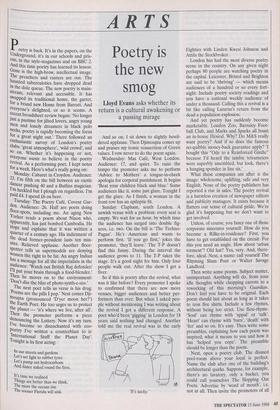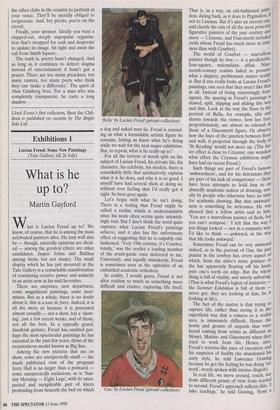ARTS
Poetry is the new smog
Lloyd Evans asks whether its return is a cultural awakening or a passing mirage Poetry is back. It's in the papers, on the Underground, it's in our schools and pris- ons, in the style-magazines and on BBC 2. And this time poetry has learned its lesson. Gone is the high-brow, intellectual image. The preachers and ranters are out. The haunted tuberculotics have dropped dead in the dole queue. The new poetry is main- stream, relevant and accessible. It has swapped its traditional home, the garret, for a brand new Home from Barratt. And everyone's delighted, or so it seems. A recent broadsheet review began: 'No longer just a pastime for jilted lovers, angry young Men and lonely dreamers in black polo necks, poetry is rapidly becoming the focus for a great night out.' There followed an enthusiastic survey of London's poetry clubs: 'great atmosphere', 'wild crowd', and s° on. Whether it's happening or not, everyone wants to believe in the poetry revival. As a performing poet, I kept notes for a week. Here's what's really going on: Monday: Cabaret in Croydon. Audience: 23. I'm fifth on the bill between an exotic dancer pushing 40 and a Butfins magician. I Irn heckled but I plough on regardless. I'm Paid £4, I spend £6 on beer. Tuesday: The Poetry Café, Covent Gar- den. Audience: 26. Half are poets doing floor-spots, including me. An aging New Yorker reads a poem about Nixon who, apparently, has just bombed Cambodia. He stops and explains that it was written a quarter of a century ago. His indictment of the dead former-president lasts ten min- utes. Relieved applause. Another floor- spotter tells us supermodels are denying Women the right to be fat. An angry Indian has a message for all the imperialists in the audience: 'Watch out British Raj defender/ I II put your brain through a food-blender.' Then he moves on to the environment: Don't diss the bliss of photo-synth-e-siss.' The next poet tells us verse is his drug. Poems are the pills I pop.' Next comes Dji- moujna (pronounced `D'yer moon her?') the Earth Poet. He too urges us to protect the planet — 'it's where we live, after all'. Then the promoter performs a piece denouncing the Lottery. Now it's my turn. I ye become so disenchanted with eco- Poetry I've written a counterblast to it: International Stuff the Planet Day'. Tonight is its first airing:
In our streets and gardens Let's set light to rubber tyres Let's pump out hydrocarbons And dance naked round the fires.
It's time we realised Things are better than we think, The more the oceans rise The sooner Florida will sink.
And so on. I sit down to slightly bewil- dered applause. Then Djimoujna comes up and praises my ironic reassertion of Green values. I vow never to do the poem again.
Wednesday: Mas Café, West London. Audience: 17, and quiet. To raise the tempo the promoter asks me to perform `Advice to Mothers' a tongue-in-cheek apologia for corporal punishment. It begins `Beat your children black and blue.' Some audiences like it, some just glare. Tonight I get the glare. As I finish, a woman in the front row has an epileptic fit.
Sunday: Clapham, south London. A newish venue with a problem: every seat is empty. We wait for an hour, by which time the audience has surged into double fig- ures, i.e. two. On the bill is 'The Techno- Pagan'. He's American and wants to perform first. 'If you go first,' jokes the promoter, 'they'll leave.' The T-P doesn't find this funny. During the interval the audience grows to 11. The T-P takes the stage. It's a good night for him. Only four people walk out. After the show I get a fiver.
So if this is poetry after the revival, what was it like before? Every promoter I spoke to confirmed that there are now more venues, bigger audiences and better per- formers than ever. But when I asked peo- ple without mentioning I was writing about the revival I got a different response. A poet who'd been 'gigging' in London for 18 years said nothing had changed. Another told me the real revival was in the early It's tacky.' Eighties with Linden Kwesi Johnson and Attila the Stockbroker.
London has had the most diverse poetry scene in the country. On any given night perhaps 80 people are watching poetry in the capital. Leicester, Bristol and Brighton are said to be 'thriving' — which means audiences of a hundred or so every fort- night. Include poetry society readings and you have a national weekly audience of under a thousand. Calling this a revival is a bit like calling Lazarus's return from the dead a population explosion.
And yet poetry has suddenly become marketable. London Zoo, Barnsley Foot- ball Club, and Marks and Sparks all boast an in-house Hesiod. Why? Do M&S really want poetry? And if so does the famous no-quibble money-back guarantee apply? 'I bought this "Ode to a Reinforced Girdle" because I'd heard the iambic tetrameters were superbly assembled, but look, there's a hanging spondee in line six.'
What these companies are after is the image: wholesome, uplifting, safe and very English. None of the poetry publishers has reported a rise in sales. The poetry revival is a harmless creation of newspaper editors and publicity managers. It exists because it flatters our sense of cultural pride. We're glad it's happening but we don't want to get involved. Unless, of course, you fancy one of those corporate sinecures yourself. How do you become a Rilke-in-residence? First, you have to get established on the circuit. For this you need an angle. How about 'urban torment'? Old hat? Yes, very. And, there- fore, ideal. Next, a name: call yourself The Rhyming Slum Poet or Walter Savage Landlord.
Then write some poems. Subject matter, unimportant. Anything will do, from your idle thoughts while chopping carrots to a reworking of this morning's Guardian. Don't feel you have to be original. Each poem should last about as long as it takes to iron five shirts. Include a few rhymes, without being too strict. Use flexi-rhyme. `Soul' can rhyme with 'appal' or 'talk'. `Heart' can rhyme with 'barn', 'death' with `fez' and so on. It's easy. Then write some preambles, explaining how each poem was inspired, what it means to you and how it has 'helped you cope'. The preamble should be longer than the poem. Next, open a poetry club. The disused pool-room above your local is perfect. Name the club after one of the building's architectural quirks. Suppose, for example, there's no lavatory, only a bucket, you could call yourselves The Slopping Out Poets. Advertise by 'word of mouth', i.e. not at all. Then invite the promoters of all the other clubs in the country to perform at your venue. They'll be morally obliged to reciprocate. And, hey presto, you're on the circuit.
Finally, your sponsor. Ideally you want a clapped-out, deeply unpopular organisa- tion that's strapped for cash and desperate to update its image. Sit tight and await the call from Smith Square.
The truth is, poetry hasn't changed. And as long as it continues to deliver dogma instead of entertainment it hasn't got a prayer. There are too many preachers, too many ranters, too many poets who think they can 'make a difference'. The spirit of Alan Ginsberg lives. For a man who was completely transparent, he casts a long shadow.
Lloyd Evans's first collection, Beat the Chil- dren is published on cassette by The Bright Side Ltd.



































































 Previous page
Previous page